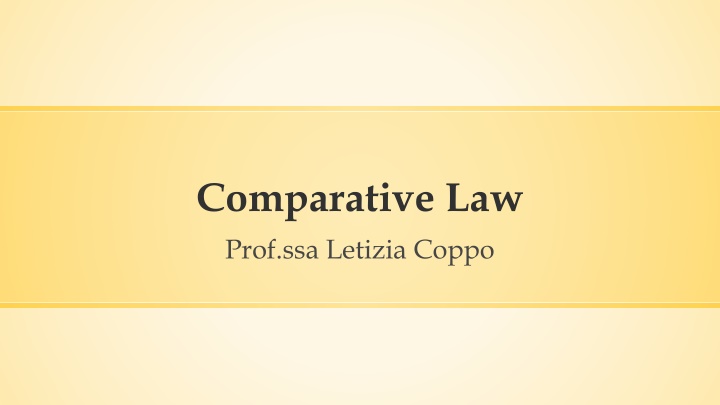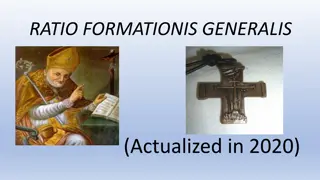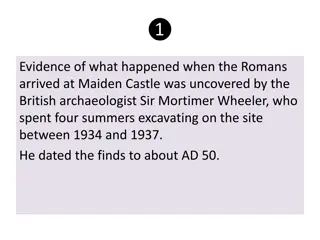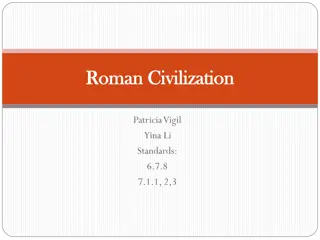Historical Origins and Formation of German Law: Influence of Roman Law
The historical origins and formation of German law were shaped significantly by the late contact with Roman law during the Medieval and Renaissance period. The weak central imperial power, rising influence of territorial rulers, and the lack of a common legal system in Germany prompted the appeal for Roman legal expertise. Jurists trained in Roman law played crucial roles in ecclesiastical institutions, principalities, and judicial positions, eventually becoming university professors. The transition towards a more systematized legal framework reflects the interplay between Roman and German legal traditions.
Download Presentation

Please find below an Image/Link to download the presentation.
The content on the website is provided AS IS for your information and personal use only. It may not be sold, licensed, or shared on other websites without obtaining consent from the author.If you encounter any issues during the download, it is possible that the publisher has removed the file from their server.
You are allowed to download the files provided on this website for personal or commercial use, subject to the condition that they are used lawfully. All files are the property of their respective owners.
The content on the website is provided AS IS for your information and personal use only. It may not be sold, licensed, or shared on other websites without obtaining consent from the author.
E N D
Presentation Transcript
Comparative Law Prof.ssa Letizia Coppo
THE ROMANISTIC LEGAL FAMILY GERMAN LAW
HISTORICAL ORIGINS - FORMATION OF GERMAN LAW I. The Medieval and Renaissance period Reception of Roman law: Germany came in contact with Roman law relatively late, not before the middle of the XV century. This late contact entailed a widespread acceptance of Roman law and a more extensive scientific systematisation of legal thought.
HISTORICAL ORIGINS - FORMATION OF GERMAN LAW Political context: central imperial power was weak, while the power of territorial rulers and feudal principalities increasing. was correspondingly The Keiser had no fixed seat, there were no central administrative bodies; there was no staff of royal officers. The Reichshofgericht was of little influence, had no independence from the Emperor and could be bypassed by local rules (privileges de non appelando and de non evocando).
HISTORICAL ORIGINS - FORMATION OF GERMAN LAW Reasons for the appeal of Roman law 1) There was no common German private law, no common court systems, no common fraternity of lawyers. 2) Local courts issued decisions based on traditional legal knowledge, practical wisdom, experience: an irrational and unpredictable method, inadequate for social complexity.
HISTORICAL ORIGINS - FORMATION OF GERMAN LAW Reasons for the appeal of Roman law Traditional law was still at a pre-scientific stage. Roman law, as the product of the Roman Empire, seemed to draw a line of succession between the Roman Empire and the Holy Roman Empire of the Germans, where the Kaiser was the new Caesar.
HISTORICAL ORIGINS - FORMATION OF GERMAN LAW Jurists trained in Roman law were employed in Ecclesiastical institutions and in the principalities and boroughs, and then moved to judicial positions. At first they were educated in Italian Universities, but later on regular classes of Roman law started to be offered also by German Universities, as local rulers wanted their own made in Germany legal experts.
HISTORICAL ORIGINS - FORMATION OF GERMAN LAW Such experts were destined to be university professors, clerks in courts and local bodies, writers of legal opinions, legal advisors for rulers, draftsmen of legal documents for principalities and towns. Their mutual activities have contributed to the formation of usus modernus pandectarum , a method for analysing and interpreting Roman law to adapt it to current problems.
HISTORICAL ORIGINS - FORMATION OF GERMAN LAW II. The age of lumi res enlightenment period The subjection of medieval institutions and traditional authorities to rational criticism has gradually given birth to the idea of codification. It pushed German jurists to read usus modernum pandectarum from a historical perspective and to systematise it.
HISTORICAL ORIGINS - FORMATION OF GERMAN LAW The law of reason broke free from its philosophical roots and became a system of principles of private law to be taught and learned. Systematisers like PUFENDORF inferred detailed rules from general principles by a rigorous logical-mathematical process. Jurists were more concerned about learned and conceptually refined definitions, than about the contact with reality.
HISTORICAL ORIGINS - FORMATION OF GERMAN LAW German princes and high officials found such idea of order most appealing. This lead to the first codifications (General Civil Code ofAustria; General Land Law for the Prussian States). The latter reflected the method of Pufendorf and the conception of men both as individuals (private property ) and as parts of larger groups in society (family, household, associations or companies, citizenship).
HISTORICAL ORIGINS - FORMATION OF GERMAN LAW The General Land Law for the Prussian States was not designed to alter the Prussian society, but to portray it faithfully, completely and objectively, so that everyone could be told in a comprehensible language what his/her place in the system was. It is the claim of an omnipotent administration, an enlightened despot, to look into and regulate permanently and exhaustively every detail of his subjects life.
HISTORICAL ORIGINS - FORMATION OF GERMAN LAW III. IX Century and the Historical School of law Cultural context: rationalism was ousted by new philosophical ideas (Kant, Herder ) and intellectual movements, among which Romanticism. Social context: rise of an ambitious bourgeoisie who suffered the authoritarianism of the State and longed for more freedom.
HISTORICAL ORIGINS - FORMATION OF GERMAN LAW Cultural legacy: like all the other expressions of culture, the law is not the product of abstract reason, but of history, people, soul, feeling and sensibility; a product of the Volksgeist. Historical School of Law (Von Savigny): the legal order is not a deliberately planned and purposive creation of an official legislator guided by reason, but a historically determined product of civilisation.
HISTORICAL ORIGINS - FORMATION OF GERMAN LAW Impact on codification: proposal to replace the unbearable diversity of German territorial laws with a general Civil code and lay the basis for the unification of Germany. Refusal of the models set out by the previous Codes as conservative, traditionalistic and provided with rationalism. Yet, time was not ripe for a code or for unification. a repulsive anti-historical
HISTORICAL ORIGINS - FORMATION OF GERMAN LAW Savigny believed that legislation, being inorganic and a-scientific, was not the right way to create a German common law; what was needed was an absorption and cultivation of the legal material in hand. He advocated the historical study of Roman law, but not the one filtered by the usus modernus pandectarum; the ancient one. Thus, the Historical school of law produced Pandettistica.
HISTORICAL ORIGINS - FORMATION OF GERMAN LAW Pandettistica schematize, systematize, order and integrate the concepts of ancient Roman law. Puchta): (Windscheid, their aim was to The aim was a dogmatic and systematic study of the Roman materials, without any room for practical reasons, social value judgements, ethics, religion or policy considerations.
HISTORICAL ORIGINS - FORMATION OF GERMAN LAW The consequence was the development of a system based on a closed order of institutions, ideas and principles from ancient Roman law: one only had to apply logical or scientific methods in order to reach the solution of any legal problem. This could happen because there was no unified law, no centralized judiciary, no fraternity of lawyers.
HISTORICAL ORIGINS - FORMATION OF GERMAN LAW (Begriffsjurisprudenz): Conceptual interpretative method based on the reduction of norms into general concepts valid as such, as dogma, without any room for heteronomous elements. Still behind the scenes. Jurisprudence an Interests-based Jurisprudence (Interessenjurisprudenz): the elaboration of legal concepts must not be the result of a merely logical process, but take into account the interests involved.
HISTORICAL ORIGINS - FORMATION OF GERMAN LAW IV. The Age of Codification (middle of IX century) First moves towards codification: general German code of commerce (1861), draft of a uniform law of obligations by famous professors and judges (1865). After Bismark s unification of the Empire (1871), to unify the courts system, civil procedure and bankruptcy became a priority.
HISTORICAL ORIGINS - FORMATION OF GERMAN LAW Towards a Civil code for Germany: in 1874 a first commission was appointed for the drafting of the Code, composed of 11 members (judges, officials of the Ministry, Professors, among which Windscheid, but no lawyers). The commission worked in seclusion, without any public consultation. The first draft was published 13 years after, in 1887.
HISTORICAL ORIGINS - FORMATION OF GERMAN LAW As soon as the draft was published, it had been subject to bitter criticism due to its scholastic structure, abstract conceptualism, accurate but hardly accessible legal wording and complex system of cross-references. A second commission was appointed in 1890, including few layman, but no major changes were made.
THE MAKING OF THE BGB Finally, German Civil code came to life under the name of in 1900, the B rgerliches Gesezbuch (BGB) and remained basically unreformed until 2001























